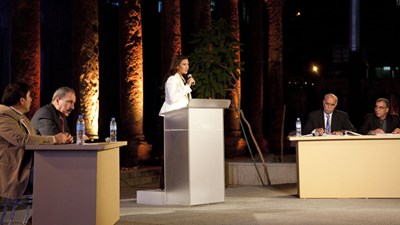28th May 2014
Debate and Democracy
A couple of years ago I attended a debate in Zarqa in which teams of young people debated the merits of nuclear power. All the participants engaged in the debate in a disciplined way, marshalling their arguments, responding to their opponents’ points and bringing passion and patience to a controversial subject.
Both teams had been trained as part of the British Council’s Young Arab Voices programme. This programme has given 1,600 young people in Jordan the skills and confidence to develop their debating skills and has organised over 400 debates including 2 national tournaments. The Embassy runs similar programmes to help young people freely express their thoughts and opinions on the issues that affect their lives.
Schools in many countries have debating societies. At my school (many years ago) we were encouraged by our teachers to tackle the most controversial subjects of the day. It taught us skills that have been invaluable in our working lives: about the importance of preparation, about setting out key points in a simple and logical way, and about anticipating the counter-arguments.
We also learned that debating was not about winning the vote, but about getting to the heart of the matter. Yes, the vote was about which side presented their facts in the most effective way. But the purpose of the debate was to expose all the vital issues to public scrutiny. Truth was more important than victory.
This approach is illustrated by the New Arab Debates, organised and run by Tim Sebastian, well-known for his Hard Talk interviews on BBC World. Last year his team organised an open air debate downtown on the Press and Publications Law. And last week they ran debates in both English and Arabic on whether “Egypt is a disappointment to the rest of the Arab World.”

These are controversial topics. But as Tim says: “We hope the answers will give a valuable insight into the mood of the Arab world as it decides the direction of its political transition.”
Promoting debate is not about trying to impose Western values or practices. Debate is the bedrock of democracy in any culture or political system. It is a fundamental part of freedom of expression which is itself recognised world-wide as a basic human right.
To realise the importance of debate we just have to look at the alternative. There are numerous examples in history of autocrats who demand blind acceptance of their rule, brook no criticism, stamp out dissent and lock up opponents. The result is a government that lacks accountability and a system that breeds corruption and resorts to violence.
The alternative is an open society which welcomes and encourages debate as a healthy way to discuss ideas. No democratic government should try to rule without listening to voters. Most policy issues have an impact on people: on the prices they pay for their bread, on the way their children are educated and on how they are treated in hospital.
It is smart politics to hear what they have to say on such issues, invite their ideas and manage their expectations. People close to the coal face know much better than central government how the education or health system is working. So central government should promote debate about the direction of change and modernisation of those services.
Debate will inevitably generate opposing views. That is healthy. It creates a constructive tension out of which bold ideas can emerge. And by trying to build consensus and an inclusive political process, governments can maintain and bolster stability. This process will help people to appreciate the full range of factors that need to be taken into account on an issue: maybe the cost is too high, maybe the environment will be damaged. And in some cases it might lead to those in authority to think again about the course they favour.
For at the heart of the matter is the dictum that it is better to debate a question without settling it than to settle a question without debate.
Dear Peter ,
well I think , that ´s just a great thing to do by attending such a debate with y o u n g people or p u p i l s in re. of nuclear power. ´Though and only in my opinion it ´s not so important of what the topics of such debates are. as long as they were held on this way as you ´ve described it so well. Esp. within the context of the British Council´s Young Arab Voices programmes. ´Cause the y o u n g e r those people (willing to learn sthg. ´bout the democratic-system) are & logical willing to learn of how to debate – the better it is for the future. By the way : I do very like yr. sentence : “…debating was (and is !) not ´bout winning the vote , but ´bout getting the heart…”. Plus : I only can agree to yr. statements of how important the learning of a best possible debate is. It ´s – also according to Sir Tim Sebastian – a bedrock of democracy. But pls. let me add : also the probably most important ground pillar for democracies all across the globe.
“…Debatten und Demokratie sind wie Zwillinge . Wenn du sie trennst, verlieren beide. / Debates and Democracies are like twins. If you disconnecting them , both will lose…” ( Olof Palme, former & late Swedish Prime Minister in 1985 ).
Best wishes & a peaceful, “friendly” Wednesday , liebe Grüßle ond ein harmonischer Mittwoch , Ingo-Steven , Stuttgart